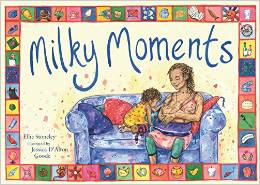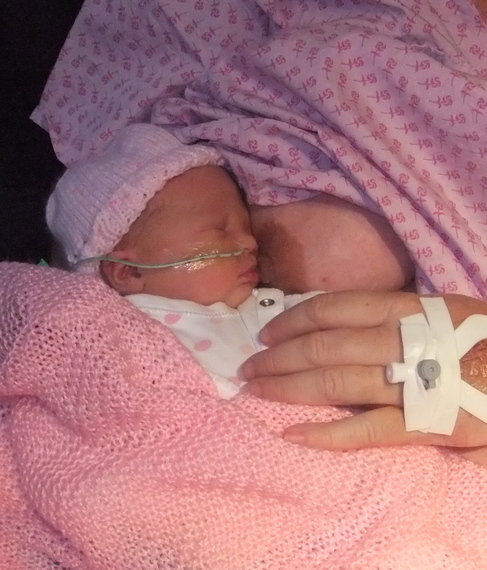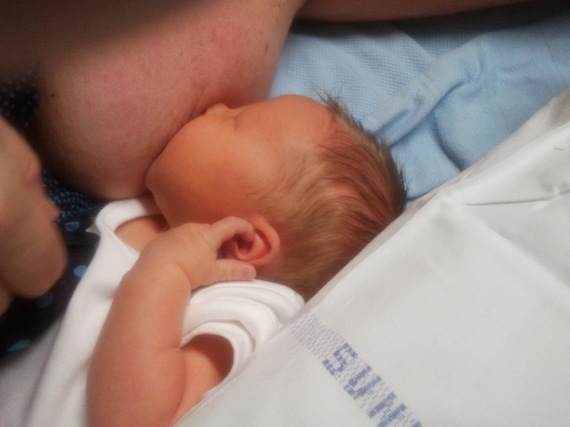 Can breastfeeding make you happy?
Can breastfeeding make you happy?
It does me, albeit, after a shaky start.
Now there is proof that it can lower your risk of depression.
A UK report says, post natal depression is more than double in women who planned to breastfeed and then were unable to, whereas the women who planned to breastfeed and then did are 50% less likely to be affected. This is significant when you consider that 1 in 10 women develop depression after the birth of a child.
I hadn’t read anything during my pregnancy about the first few weeks after the birth of a baby, I think I was so convinced that we’d never make it all the way. I was an older first time mother and was frequently reminded of the risks my pregnancy faced. We attended NHS antenatal classes. I knew I was having to have a Cesarean section so I felt a little detached from the session on gas and air, on forceps and ventouse and I took note of the best way to bath a newborn and squirrelled away the bits of advice the midwife gave about cotton wool and water vs wipes and the temperature in the bedroom.
The thing that made me sit up and take notice was the bit about breastfeeding. Again, I hadn’t really given it much thought other than to presume that if the pregnancy went full term and the baby was born healthy, that we would breastfeed. I pondered the round knitted breasts, wondered about breast pads and booked onto a breastfeeding workshop at the maternity hospital just before the baby was due.
To be honest it all sounded slightly odd. but I decided it was something I ought to do to ensure I was as prepared as a very unprepared mother could be for what was to come.
Going to that workshop totally changed my understanding of breastfeeding and gave me a reality check of what was ahead – how it might be a challenge and wouldn’t always be straightforward but that there was help available. I felt a complete idiot when I realised that breastmilk doesn’t just come from a hole in end of the nipple (I guess I’d always presumed it did), but from ducts leading to tiny holes over the whole nipple area. Who knew?
I was fascinated to learn about the different types of milk: the colostrum, the fore milk, the hinde milk and the feel good factor of oxytocin. I was relieved to realise that my own utter lack of awareness about the whole breastfeeding process was shared by other mothers in the room. Breastfeeding and milk production should be covered on the school syllabus and in more depth in ante natal classes.
Recent research (published September 2013) in the US showed that some 92% of women (new mothers) who were surveyed when their baby was three day old were stressed about breastfeeding – Were they making enough milk? Was the baby able to latch properly? Was the baby feeding enough? These worries seemed to centre around the inevitability of giving up on breastfeeding. These concerned mothers were three times more likely to start giving formula before two months, and nine times more likely to stop breastfeeding altogether.
One of the conclusions of that report was summed up by its author, Laurie A. Nommsen-Rivers, from Cincinnati Children’s Hospital Medical Centre, “If we are able to provide mothers with adequate support, 95 percent of all breastfeeding problems are reversible.” She stressed that new mothers need to know that, “They’re not alone, and it’s really common to struggle in those first few days.”
This struck a real chord with me. My daughter was born a little premature. She was blue and grunting and was wisked away from me almost as soon as she was born. She had a nasal gastric tube inserted almost immediately to help her with eating, she was on oxygen and a drip, she was a poorly little soul. I was also poorly, my heart developed an erratic beat right at the end of an otherwise fairly uneventful pregnancy, I was heavily sedated for my Caesarean section (two spinal blocks). I was convinced that my baby wouldn’t make it, Bruce Springsteen was playing in the background singing about keeping “your eyes on the prize,” my husband was in a pink paper hat, and what seemed to be several hundred medical staff were helping. All I could do was apologise, to anyone who would listen, for being so anxious.
All I remember of her first moments on the outside is a blur as the baby was waved in my direction over the top of the dividing curtain before it was rushed away to be taken care of, I didn’t even realise she was a girl. I do, however, remember being absolutely determined to breastfeed her when she was finally given back to me. I recall thinking there was no way it could happen as her mouth, her perfect little mouth was tiny compared to the size of my nipple, but we did manage for a few moments before being taken up to the SCBU.

We were able to be together again after 48 hours apart and feeding her became the main activity for the next week in hospital. I expressed milk, I breastfed her, very inadequately it felt, and I also fed her formula through her nose tube. I don’t remember much else other than constantly asking for help, the feelings of frustration when she couldn’t latch on, the worry when I felt she wasn’t getting enough milk and feelings of inadequacy.
I do recall the black comedy of feeling my breasts were almost public property as midwife after midwife pushed them into the best position, moved my nipple toward the baby’s mouth and encouraged us to keep going. We were so lucky to have support, particularly from a lady called Rachel, a lactation consultant who unobtrusively walked the ward and saw our plight. She was calm and sensible and the advice offered gave me confidence and helped us to start believing I really could nurse my baby, she also spotted that my daughter had a slight tongue tie. The tongue tie had to be dealt with in a different hospital 16 days after birth. Once that had been snipped my little girl was able to feed immediately, latch and suckle deeply and things became easier.
Even then it was a fortnight later that I went to a breastfeeding drop in. Incredibly nerve wracking to walk into a room full of women nursing babies and admit that you felt you weren’t doing it right. Again the calm and sensible support from the ladies of the local La Leche League helped no end, and from that day onwards she’s been feeding voraciously and still is 2 1/2 years later. As I said, we were lucky, and I was stubborn and determined and also understood early on that it might not all be easy.

In the UK some 81% of women start breastfeeding at birth and only 34% of them are still nursing at 6 months, only 1% breastfeed exclusively at 6 months, most give up during the first four weeks. My daughter decided herself at 4 1/2 months to reject bottles completely, from then on she was exclusively breastfed until about 7 months when we introduced solids, I continue to breastfeed her 2 1/2 years on, as and when she wants her ‘milky’, she has a wide and varied diet and is a thriving exuberant child.
Women give many reasons for not breastfeeding at all, or for stopping early on; family influence (mothers, grandmothers, mother in laws who formula fed not being supportive), anxieties over nursing in public, health visitor concern over growth (I was advised around 6 months to switch to formula when she was showing low weight gain against the sacred centile chart, advice which I ignored), issues around pumping, lack of support in the workplace, mastitis, concern over the amount a baby is getting, lack of professional support and lack of awareness of professional support.
Jacque Gerrard, Director of the Royal College of Midwives (England) believes that having more midwives would make a big difference to ensuring that women are helped, as I was, to establish positioning and latch before they leave hospital, she also advocates the UNICEF BFI (Baby Friendly Initiative) being mandatory in every NHS trust in the UK as a part of a Public Health England breastfeeding campaign.
In Rwanda 90% of mothers are still exclusively breastfeeding their infants 6 months after birth due to awareness raising encouraged by a ‘paid’ hour during the working day to breastfeed, and Cambodia, through the use of a “rampant media campaign” to raise awareness not just of the benefits but the issues and how to’s increased the number of nursing mothers (at 6 months) from 11% to 74% in ten years.
Breastfeeding has provided me with some of the most rewarding, intimate and happy moments of motherhood and I count myself blessed to have been able to decide I wanted to and to be able to nurse, and that I had the confidence to ask for help, and find it at a time when my anxieties about breastfeeding did threaten to overshadow our first few weeks together.
The key message, as highlighted by the British Avon Lonitudinal Study of Parents and Children is “the importance of providing expert breastfeeding support to women who want to breastfeed; but also, of providing compassionate support for women who had intended to breastfeed, but find themselves unable to”. This will have significant impact on women in not just dealing with the early stress so many feel around breastfeeding, but those who go on to suffer from post natal depression and don’t or are unable to continue to breastfeed.
Ellie Stoneley writes about her experiences as a first time older mother at Mush Brained Ramblings and has published a picture book for children and their families, themed around breastfeeding. Find out more at http://www.facebook.com/MilkyMomentsBook.
Follow Ellie Stoneley on Twitter: www.twitter.com/e11ie5
